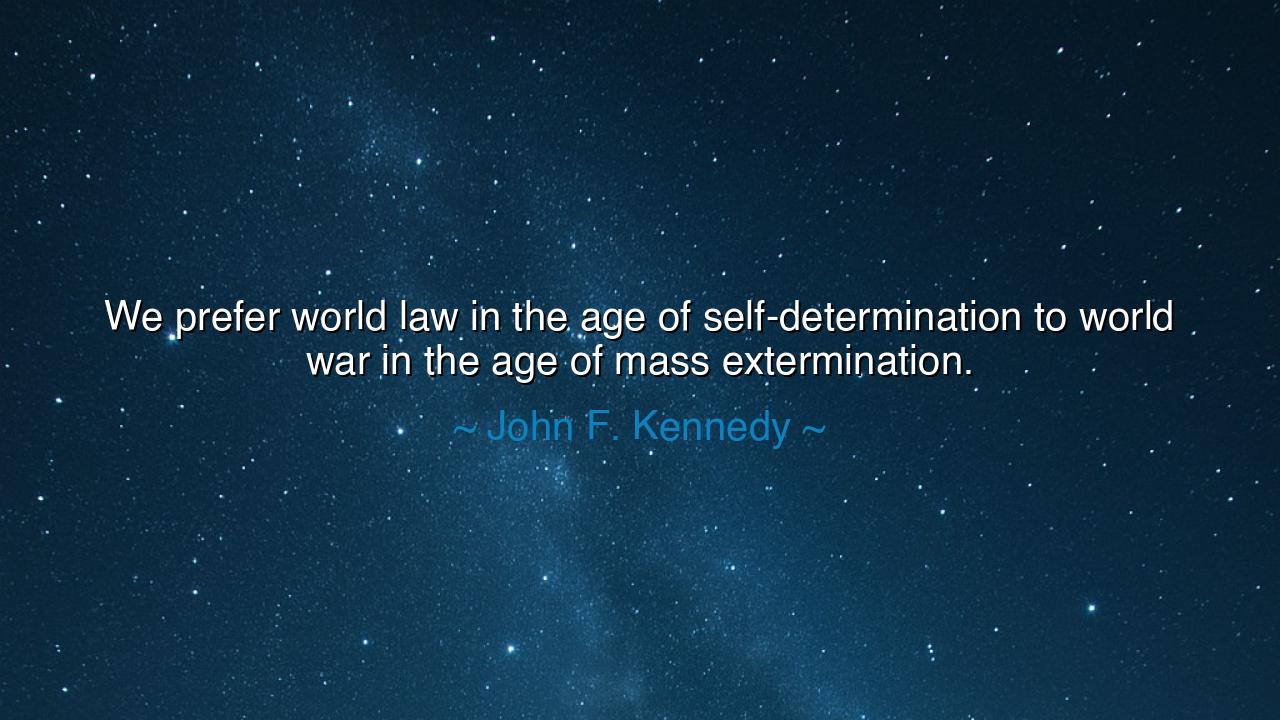
We prefer world law in the age of self-determination to world war
We prefer world law in the age of self-determination to world war in the age of mass extermination.






“We prefer world law in the age of self-determination to world war in the age of mass extermination.” — John F. Kennedy
Thus spoke John F. Kennedy, a man who stood at the very edge of the abyss — an age when humanity had harnessed the power to unmake itself. In this declaration, he does not merely utter the words of a statesman; he speaks as a guardian of civilization itself. His words echo like a prayer for reason in an age of madness. The “age of self-determination” was the era of new nations rising from the ashes of empire, claiming their right to shape their own destinies. But it was also the “age of mass extermination,” when the terrible weapons of the twentieth century could erase whole peoples in an instant. Kennedy’s plea was simple, yet profound: let the rule of law guide the world, not the rule of fear.
The origin of this quote lies in the crucible of the Cold War, when the world trembled between peace and annihilation. Kennedy, speaking before the United Nations in 1961, sought to rally humankind toward the ideal of collective peace through international law. It was a time when the shadow of nuclear fire hung heavy over every nation. The great powers stood armed with weapons capable of extinguishing life on Earth — a peril unseen in all human history. Yet amid this darkness, Kennedy dared to speak of hope: that the nations of the world could submit to the higher authority of justice, not the blind vengeance of war.
In his words, “world law” does not mean domination by one nation or ideology, but the creation of a shared moral order — a covenant among peoples to settle conflict through dialogue, through reason, through the disciplined compassion of humanity’s collective will. Kennedy understood that the old ways of power — conquest, empire, retaliation — could no longer sustain a world armed with atomic fire. In earlier ages, war could be survived; in his, it meant extinction. Thus he called for a transformation of the human spirit: that we abandon the sword for the scales of justice, the bomb for the pen, the rivalry of nations for the unity of mankind.
History has tested this vision many times. Consider the Cuban Missile Crisis of 1962, when Kennedy himself faced the brink of apocalypse. For thirteen days, the world held its breath as nuclear war loomed nearer than ever before. Yet it was not strength of arms that saved humanity — it was diplomacy, the quiet courage of restraint. Kennedy and Soviet Premier Nikita Khrushchev chose conversation over confrontation, reason over pride. Their decision to step back from destruction was a living testament to Kennedy’s own words: that law, not war, must govern the future of humankind. In that moment, the wisdom of restraint saved not only nations but civilization itself.
The ancients, too, spoke of this wisdom. The philosopher Heraclitus taught that “war is the father of all things,” for strife drives change. Yet in the atomic age, this truth was reversed — for war had become the destroyer of all things. Kennedy’s words mark the evolution of that ancient idea. He calls upon humanity to seek creation through order, not chaos; through self-determination, not domination. The law of nations, if built upon justice and equality, becomes not a cage, but a framework within which freedom may flourish. For only when liberty is tempered by responsibility can peace endure.
There is also in his words a moral challenge. To prefer world law is not the easier path — it demands patience, humility, and faith in human reason. It requires nations to restrain their pride and individuals to see beyond the narrow borders of their tribe. It means recognizing that the fate of one nation is bound to the fate of all. This is the eternal tension between sovereignty and solidarity, between the right to self-rule and the duty to coexist. Kennedy reminds us that civilization itself depends on the courage to balance these forces. For without such balance, self-determination dissolves into anarchy, and freedom devours itself.
Practical counsel for the seeker:
-
Uphold dialogue over dominance — seek to understand before you retaliate.
-
Remember that justice, not vengeance, is the foundation of peace.
-
Let the law of compassion guide your dealings, both as individuals and nations.
-
And never forget that restraint is often the truest form of courage.
For as John F. Kennedy teaches, the future of humanity depends not on the power to destroy, but on the wisdom to preserve. In an age when we command the forces of life and death, the greatest act of strength is to choose peace. The rule of law may seem slow, imperfect, even frail — but it is the only shield we possess against the darkness of annihilation. Let the world remember this truth: that when passion blinds and power tempts, only law, reason, and humanity can keep the flame of civilization burning.






AAdministratorAdministrator
Welcome, honored guests. Please leave a comment, we will respond soon